13. Post-Reformation, Revival, the Great Awakening
| Key Dates # |
|
|---|
| 1603 | James I becomes King of England
|
| 1610 | Brother Lawrence born
|
| 1611 | King James Version, the most influential English translation of the Bible
|
| 1620 | Plymouth, Massachusetts colony founded by Puritans
|
| 1625 | Charles I becomes King. He too is against the Puritans
|
| 1628 | Puritan John Bunyan, author of Pilgrim's Progress among other works
|
| 1648 | End of the Thirty Years War; Treaty of Westphalia > the end of chronic
Catholic/Protestant wars that started after the Reformation.
|
| 1658 | Cromwell dies
|
| 1660 | Charles II becomes King of England
|
| 1685 | Birth of JS Bach, one of the greatest composers of all time (died 1750)
|
| Birth of George Frideric Handel, Baroque composer famous for his operas,
oratorios, anthems and organ concertos (died 1759)
|
| 1688 | William & Mary on English throne. Puritans free to preach, establish churches
|
| 1703 | Jonathan Edwards born
|
| 1714 | George Whitefield born
|
| 1718 | David Brainerd, American missionary among indigenous Americans (particularly the
Delaware Indians of New Jersey), born at Haddam, Connecticut (died 1747)
|
| 1727 | Revival among Count Nikolaus Ludwig Zinzendorf and Hussite Moravian refugees
he had taken in. Moravian missionary movement *
|
| 1720s | Beginning of the First Great Awakening
|
| 1734-1737 | The Great Awakening continues as Jonathan Edwards preaches in Massachusetts.
Revival spreads to Connecticut
|
| 1739-41 | George Whitefield joins Edwards. Travelled between England and America 13
times; reached about 80% of the American colonists with the Gospel
|
| 1759 | William Wilberforce, evangelical who fought against slavery, born
|
| 1779 | Olney Hymns produced by John Newton and William Cowper.
|
| 1784 | John Wesley baptizes Thomas Coke, making Methodism a denomination separate
from the Church of England
|
| 1792 | William Carey, "Expect great things from God. Attempt great things for God." *
|
| 1792 | Particular Baptist Society for Propagating the Gospel among the Heathen
founded, later called the Baptist Missionary Society *
|
| 1792 | Charles Finney, forerunner of modern revivalism, born
|
| 1795 | London Missionary Society founded *
|
| 1799 | Church Missionary Society founded *
|
| 1824 | Charles Finney leads revivals in the USA. The Second Great Awakening
|
* The story of Christian missions will be covered later in the semester.
Influential People and Events
Brother Lawrence (1611-1691)
Born Nicholas Herman in France, he served for a period in the army before retiring due to injury.
He then entered the Discalced Carmelite monastery in Paris as Brother Lawrence.
He was assigned to the monastery kitchen where, amidst the tedious chores of cooking and
cleaning at the constant bidding of his superiors, he developed his rule of spirituality and work.
"I began to live as if there were no one save God and me in the world." Brother Lawrence
cooked meals, ran errands, scrubbed pots, and endured the scorn of the world as though in
everything he did he was in the presence of God. "As often as I could, I placed myself as a
worshiper before him, fixing my mind upon his holy presence, recalling it when I found it
wandering from him. This proved to be an exercise frequently painful, yet I persisted through all
difficulties."
For three centuries the writings of Brother Lawrence have taught Christians that God is as
present in the kitchen as in the cathedral/church and as accessible in the living room as He is
around the Lord's Table.
This simple, yet profound teaching has empowered many to seek the joy of God's presence in the
midst of every moment and circumstance.
John Bunyan (1628-1688) - "Pilgrim's Progress"
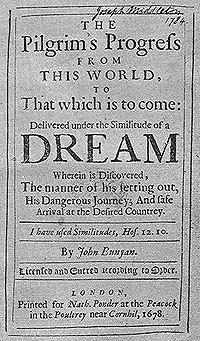
"Pilgrim's Progress
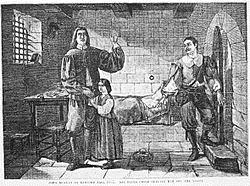
Bunyan in Jail
John Bunyan started out as a tinker (an itinerant tinsmith) and served in the parliamentary army
from 1644 to 1647. He was received into the Baptist church in Bedford by immersion in 1653.
In 1655, Bunyan became a deacon and began preaching. In 1658 he was charged with preaching
without a license. In November 1660 he was taken to the county jail in Silver Street, Bedford,
and confined (with the exception of a few weeks in 1666) for 12 years until January 1672. He
then became pastor of the Bedford church. In March 1675 he was again imprisoned for six
months) for preaching without a license. Bunyan was a forerunner of open air preaching that
enabled him to reach vast numbers of people shut out by ecclesiastical traditions and
intolerance.
Bunyan wrote The Pilgrim's Progress, the most successful allegory ever written. The book is an
allegory of the conflict between religion and society, featuring Bunyan's own spiritual struggle as
he found salvation in Christ and began preaching. He wrote other books, including one which
discussed his inner life and reveals his preparation for his appointed work is Grace Abounding to
the Chief of Sinners (1666).
In theology Bunyan was a Puritan, but not legalistically so.
George Fox (1624-1691) - The Quakers
In the mid 1600s Fox, a shoemaker, began a four year journey throughout England, seeking
answers to spiritual questions he could not find answers to in the established church.
Disappointed with the answers he received from religious leaders, he felt an inner call to
become an itinerant preacher. He frequently ran into trouble when he visited churches and
preached his own messages, sometimes contradicting what the official ministers had said. Fox's
own meetings were radically different from orthodox Christianity: simple premises, silent
meditation, with no music, rituals, or creeds. His movement (which he named "The Friends of
Truth") ran afoul of Oliver Cromwell's Puritan government, as well as that of Charles II, when
the monarchy was restored. Fox's followers, called Friends, refused to pay tithes to the state
church, would not take oaths in court, declined to lift their hats to those in power, rejected the
idea of Christmas and refused to serve in combat during war. Furthermore, they fought for the
end of slavery and more humane treatment of criminals, both unpopular stands at the time.
Once, when hauled before a judge, Fox chided the jurist to "tremble before the word of the
Lord." The judge mocked Fox, calling him a "quaker," and the nickname stuck. Quakers were
persecuted across England, and hundreds died in jails. They fared no better in the American
colonies. Colonists who worshiped in the established Christian denominations considered
Quakers heretics. "Friends" were deported, imprisoned and some were hanged as witches.
Eventually they found a haven in Rhode Island, which decreed religious tolerance. William Penn
(1644-1718), a prominent Quaker, received a large land grant in payment for a debt the crown
owed his family. Penn founded Pennsylvania colony and worked Quaker beliefs into its
government. Quakerism flourished there. Over the years they were accepted and branches were
established in many countries in the world, including Australia. They remain influential.
The Puritans
The Puritans were members of a group of English Protestants who in the 16th and 17th centuries
advocated strict religious discipline along with simplification of the ceremonies and creeds of
the (dominant) Church of England. They lived in accordance with Protestant precepts of the
time, including teaching that regarded pleasure or luxury as sinful.
Puritanism was stern and sombre; it was founded on strict Calvinism; it had a huge overburden
of legalism rather than grace. Christian writers note that the Puritans lived under a covenant of
"works". This was because they had not yet fully grasped the whole truth of divine revelation.
For example, a man might be fined, imprisoned, or whipped for non-attendance at church
services; he would be dealt with still more harshly if he spoke against religion or denied the
divine origin of any book of the Bible. Laws were made that tended to force the conscience, to
curb the freedom of the will, and to suppress the exuberance of youth -- laws that could not
have been enacted and enforced by a people who comprehended the full meaning of the Gospel.
However, their lifestyle needs to be evaluated in the context of their times.
The Puritans worked for religious, moral and social reforms. The strict ideas of John Calvin were
pivotal to their beliefs. The Puritans contended that the Church of England had become a
product of political struggles and man-made doctrines. In the end, they concluded that the
church was beyond reform. Escaping persecution, many Puritans went to America.
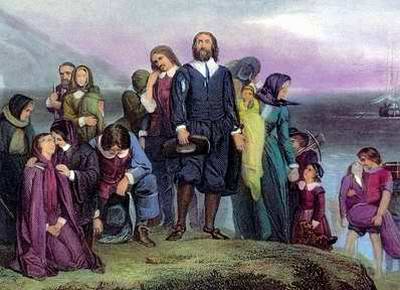 In September 1620, a merchant ship called the Mayflower set sail from Plymouth, a port on the
southern coast of England. On this trip the ship carried 102 passengers, all hoping to start a new
life on the other side of the Atlantic. Nearly 40 of these passengers were Protestant Separatists-
they called themselves "Saints"-who hoped to establish a new church in the New World. Today,
we often refer to the colonists who crossed the Atlantic on the Mayflower as "Pilgrims." The
Puritans believed the Bible was God's law, and that it provided a plan for living. The established
church limited access to God to the confines of "church authority". Puritans sought to strip away
traditional trappings and formalities of Christianity that had been slowly building.
In September 1620, a merchant ship called the Mayflower set sail from Plymouth, a port on the
southern coast of England. On this trip the ship carried 102 passengers, all hoping to start a new
life on the other side of the Atlantic. Nearly 40 of these passengers were Protestant Separatists-
they called themselves "Saints"-who hoped to establish a new church in the New World. Today,
we often refer to the colonists who crossed the Atlantic on the Mayflower as "Pilgrims." The
Puritans believed the Bible was God's law, and that it provided a plan for living. The established
church limited access to God to the confines of "church authority". Puritans sought to strip away
traditional trappings and formalities of Christianity that had been slowly building.
The English Civil War (1642-1651)
The English Civil War was a series of conflicts between Parliamentarians and Royalists. The first
(1642-46) and second (1648-49) civil wars pitted the supporters of King Charles I against the
supporters of the Long Parliament, while the third war (1649-51) saw fighting between
supporters of King Charles II and supporters of the Rump Parliament. The Civil War ended with a
Parliamentary victory at the Battle of Worcester on 3 September 1651.
The Civil War led to the trial and execution of Charles I, the exile of Charles II, and replacement
of the English monarchy with first, the Commonwealth of England (1649-53), and then with a
Protectorate (1653-1659), under the rule of Oliver Cromwell (and, after his death, his son
Richard). The monopoly of the Church of England on Christian worship ended with the victors
consolidating the established Protestant Ascendancy in Ireland.
The wars established the precedent that an English monarch cannot govern without Parliament's
consent, although this concept was legally established only with the Glorious Revolution later in
the century. The Protectorate Parliament was not a success and was dissolved in 1659; the Rump
Parliament was recalled, leading eventually to the restoration of the monarchy in 1660.
Some Christian Leaders During this Period
John Wesley (1703-1791) and Charles Wesley (1707-1788)
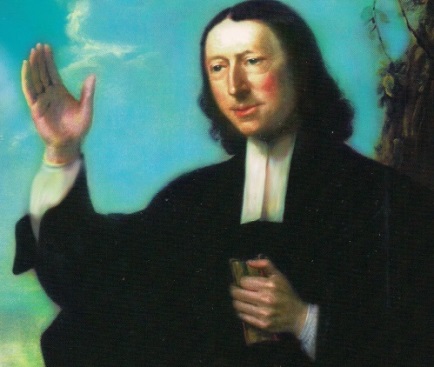
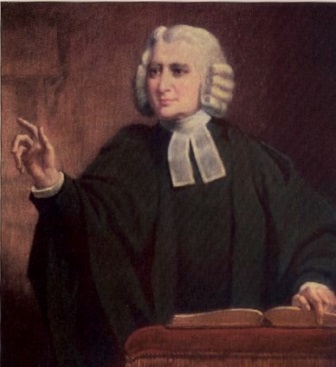
John and Charles Wesley worked together in the rise of Methodism in the British Isles during the
18th century. They were among the ten children surviving infancy born to Samuel Wesley (1662 -
1735), Anglican rector of Epworth, Lincolnshire, and Susanna Annesley Wesley, daughter of
Samuel Annesley, a "dissenting" minister. John Wesley's mother was important in his emotional
and educational development. His education continued at Oxford, where he studied at Christ
Church and was elected (1726) fellow of Lincoln College. He was ordained in 1728.
After a brief absence (1727-29) to help his father at Epworth, he returned to Oxford. His
brother Charles had (in 1729) founded a Holy Club composed of young men interested in spiritual
growth. John became a leading participant of this group, dubbed the Methodists by other
students. His Oxford days introduced him not only to classical literature and philosophy but also
to works like Thomas a Kempis' Imitation of Christ, Jeremy Taylor's Holy Living and Dying, and
William Law's Serious Call.
In 1735 both Wesleys accompanied James Oglethorpe to the new colony of Georgia, where John's
attempts to apply his High-Church views aroused hostility. Discouraged, he returned (1737) to
England; he was rescued from this discouragement by the influence of the Moravian preacher
Peter Boehler. He began to realise that religion alone was not enough, and that his new friends
had a personal faith in Christ as their Saviour that he did not. At a small religious meeting in
Aldersgate Street, London, on 24 May 1738, Wesley had an experience in which his "heart was
strangely warmed. I felt that I did trust in Christ, Christ alone for salvation; and an assurance
was given me, that He had taken away my sins, even mine, and saved me from the law of sin
and death" In its context, this amounted to the time of his true conversion to Christ, which
centred on the realization of salvation by faith in Christ alone; he then devoted his life to
evangelism. Because of his evangelical preaching many churches barred him their pulpits.
Beginning in 1739 he established Methodist societies throughout the country.
From the start, the Methodists were concerned with personal holiness and emphasized the need
for an experience of salvation. To that end, they were involved in the earliest Sunday Schools,
and the first church publishing house in America was formed by them in 1789.
The Methodists were an integral part of the Second Great Awakening (1790-1840) and made
great use of revival meetings and camp meetings to call people to Christ. The concept of
circuit-riding preachers was developed by the Methodists and was used in frontier areas.
A preacher would be responsible to travel from settlement to settlement, preaching and serving
the people there until there was a large enough body to call a full-time pastor. The Methodist
Church follows general Wesleyan theology: belief in the sinfulness of man, the holiness of God,
the deity of Jesus Christ, and the literal death, burial, and resurrection of Jesus for salvation.
Wesley travelled and preached constantly, especially in the London-Bristol-Newcastle area, with
frequent trips into Wales, Ireland, and Scotland. He initially encountered considerable
opposition, which later subsided. He died at 88, still preaching, traveling, and a clergyman of
the Church of England. In 1784, however, he had given the Methodist societies a legal
constitution, and in the same year he ordained Thomas Coke for ministry in the United States;
this action signalled an independent course for Methodism.
Charles Wesley quickly earned admiration for his ability to capture universal Christian
experience in verse, often sung using popular tunes of the day. His hymns (many of which are
still sung) include: "And can it be", "Hark! The Herald Angels Sing", "O for a Thousand Tongues
to Sing", and "Love Divine, All Loves Excelling".
Jonathan Edwards (1703-1758)
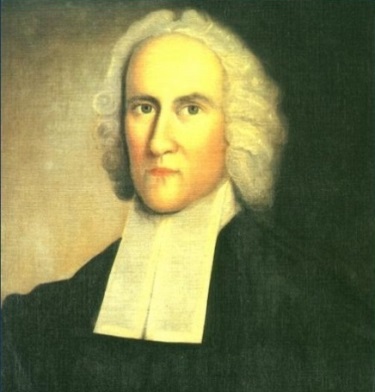
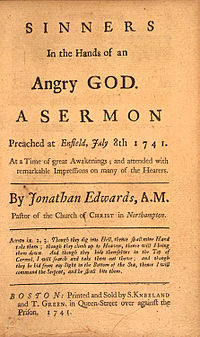
Christian preacher and theologian. Edwards is widely acknowledged to be America's most
important and original philosophical theologian, and one of America's greatest intellectuals.
As a young man, Edwards was unable to accept the Calvinist sovereignty of God. He wrote,
"From my childhood up my mind had been full of objections against the doctrine of God's
sovereignty. It used to appear like a horrible doctrine to me". However, in 1721 he changed his
views. Meditating on 1 Timothy 1:17, he observed, "As I read the words, there came into my
soul, and was as it were diffused through it, a sense of the glory of the Divine Being; a new
sense, quite different from any thing I ever experienced before... I thought with myself, how
excellent a Being that was, and how happy I should be, if I might enjoy that God, and be rapt up
to him in heaven; and be as it were swallowed up in him forever!" From then on, he preached
the sovereignty of God. Edwards later recognized this moment as his conversion to Christ.
In 1727 he was ordained a minister at Northampton, assisting his grandfather, Solomon Stoddard.
However, Stoddard died on February 11th, 1729, leaving to his grandson responsibility for one of
the largest and wealthiest congregations in the colonies. Throughout his time in Northampton
his preaching brought remarkable religious revivals. Edwards was a key figure in what has come
to be called the First Great Awakening of the 1730s and 1740s.
Tensions flamed as Edwards would not continue his grandfather's practice of open communion.
Stoddard believed that communion was a "converting ordinance." Edwards became convinced
that this was incorrect, his rejection of the doctrine resulted in his dismissal in 1750. He then
moved to Stockbridge, Massachusetts, a frontier settlement, where he ministered to a small
congregation and served as missionary to the Housatonic Indians. Having more time for study
and writing, he wrote what became a celebrated work, The Freedom of the Will (1754).
Edwards was elected president of the College of New Jersey (later Princeton University) in early
1758. He was a popular choice, for he had been a friend of the College since its inception and
was the most eminent American philosopher-theologian of his time. On March 22, 1758, he died
of fever at the age of fifty-four following experimental inoculation for smallpox and was buried
in the President's Lot in the Princeton cemetery beside his son-in-law, Aaron Burr.
Edwards rejected much of the Puritan tradition and called for unity amongst all Christians. His
most famous sermon was "Sinners in the Hands of an Angry God," delivered in 1741. In this
message he explained that salvation was a direct result from God and could not be attained by
human works as the Puritans preached.
British preacher, Dr. Martin Lloyd-Jones, said of Edwards: No man is more relevant to the
present condition of Christianity than Jonathan Edwards. He was a mighty theologian and a
great evangelist at the same time... he was preeminently the theologian of revival. If you want
to know anything about true revival, Edwards is the man to consult." Edwards continues to
influence American Christian leaders, eg Dr Timothy Keller, founding pastor of Redeemer
Presbyterian Church in New York City.
An investigation was made of 1,394 known descendants of Jonathan Edwards. 13 became
college presidents, 65 college professors, 3 United States senators, 30 judges, 100 lawyers, 60
physicians, 75 army and navy officers, 100 preachers and missionaries, 60 authors of
prominence, one a vice-president of the United States, 80 became public officials in other
capacities, 295 college graduates, among whom were governors of states and ministers to
foreign countries.
The Great Awakening
The Great Awakening was a period of revival that spread throughout the American colonies in
the 1730s and 1740s. It rejected baptismal regeneration (ie being born again through infant
baptism) emphasized individuals and their spiritual experiences. It came at a time when men
and women in Europe and the American colonies were questioning the role of the individual in
religion and society. It began at the same time as the Enlightenment which emphasized logic
and reason and stressed the power of the individual to understand the universe based on
scientific laws. Similarly, individuals grew to rely more on a personal approach to salvation than
church dogma and doctrine.
Under the preaching of Jonathan Edwards, revival came to Northampton (USA) in 1735, and over
300 converts were added to the church. Edwards recognized this was the work of the Holy
Spirit, for only God could convert a sinful heart and transform lives of self-seeking into lives of
Christian holiness. He shared the stories of the revival with correspondents in America and
England, publishing A Faithful Narrative of the Surprising Work of God in 1737. This was only
the beginning; the revival spread quickly and many were converted to Christ.
When the English evangelist George Whitefield travelled throughout the American colonies in
1740-1741, revival swept through the colonies, bringing a "Great Awakening" to many. Edwards'
preaching in Northampton and surrounding churches continued to call people to recognize their
sinful condition and seek the Lord. Many were affected by Edwards' preaching. Some cried out
or wept in fear as they thought of the eternity awaiting them without Christ.
The move stressed individual experience over church doctrine, decreasing the importance and
weight of the clergy and the church in many instances. New denominations arose or grew in
numbers as a result of the emphasis on individual faith and salvation. It unified the American
colonies as it spread. It did not form around a complex theology of religious freedom, but
nevertheless the ideas it produced opposed the notion of a single truth or a single church. As
preachers visited town after town, sects began to break off larger churches and a multitude of
Protestant denominations sprouted. Older groups that had dominated the early colonies - the
Puritans and the Anglicans - eventually began a drastic downward trend in popularity.
The effect of Great Awakening unity was an attitude that went against the deferential thinking
that consumed English politics and religion. Rather than believing that God's will was
necessarily interpreted by the monarch or his bishops, the colonists viewed themselves as
capable of performing the task. The chain of authority no longer ran from God to ruler to
people, but from God to people to ruler. The children of revivalism later echoed this radicalism
and popular self-righteousness in the American Revolution, when self-assertion turned against
the ways of George III. Colonists were able to step out from under the protectorate of the
established Christian churches and assert religious control over their own nation's destiny.
George Whitefield (1714-1770)
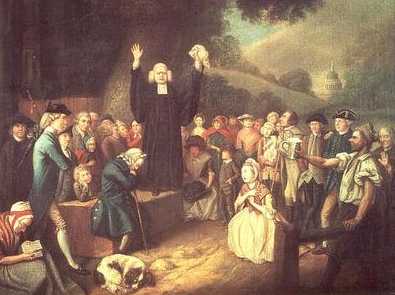
English Anglican preacher who helped spread the Great Awakening in Britain and the British
North American colonies.
As a young man, Whitefield considered becoming a preacher and spent hours studying his Bible,
often reading late into the night. Shortly before entering Oxford, he was converted to faith in
Christ. While at Oxford, he met John and Charles Wesley, forming a friendship that God would
use on both sides of the Atlantic to influence multitudes with the Gospel. All three Englishmen
went to America in 1738. The movement known as the Great Awakening was just beginning, and
this was a time when God's Spirit moved across the nation.
When Europeans first came to the New World in the early 1600s, some were eager to share their
faith in Christ with the indigenous Americans. They desired to create a "shining city on a hill"
that would be an example to the rest of the fallen world, an idea that John Winthrop preached
about on his way to Massachusetts. Many were seeking a country where they could freely
practice their faith, unlike the nations from which they fled. By the early 1700s, traditional
churches had largely settled into self-satisfaction. Their preachers delivered dry sermons and
avoided speaking about winning souls to Christ. Under this kind of leadership, faith often
withered, lacking the vital spark that would make it relevant to their everyday lives.
Due to his preaching style, pulpits closed to Whitefield in many "respectable" English churches.
When this happened, he took his messages outside, often preaching in meadows at the edges of
cities. This was considered sacrilege to the "proper" church members of his day, but large
numbers of people alienated from the organised church were reached and thousands were
converted.
Whitefield joined other ministers like Jonathan Edwards, Gilbert Tennent, David Brainerd, and
the Wesley brothers to rekindle believers' faith in Christ. The revival of the Great Awakening
was an event in which all of the colonies shared, giving them a common, unifying experience.
Many believe that God used the Great Awakening to draw the American colonies into closer
union, preparing them for independence.
During his lifetime, Whitefield delivered over 18,000 sermons to an estimated ten million
people, averaging roughly ten sermons a week. This was extraordinary at a time when there
were no television or mass communication.
John Newton (1725-1807) - "Amazing Grace"
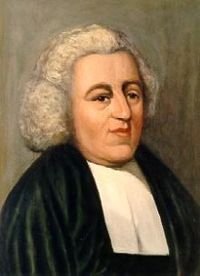
John Newton, an Englishman, was nurtured by a Christian mother who taught him the Bible at an
early age until she died prematurely. When he was 11, he went on his first of six sea-voyages
with the merchant navy captain.
He spent his later teen years at sea before being press-ganged (a form of conscription common
at the time) aboard the HMS Harwich in 1744. He rebelled against the discipline of the Royal
Navy and deserted. He was caught, put in irons, and flogged. He eventually convinced his
superiors to assign him to a slave ship. Newton took up employment with a slave-trader named
Clow, who owned a plantation on an island off of West Africa. But he was treated cruelly by
Clow and his African mistress; soon his clothes turned to rags, and he was forced to beg for food.
Newton was transferred to the Greyhound, a Liverpool ship. In 1747, on its homeward journey,
the ship was overtaken by an enormous storm. Newton had been reading Thomas a Kempis' The
Imitation of Christ, and was powerfully struck by a line about the "uncertain continuance of
life." He recalled the passage in Proverbs, "Because I have called and ye have refused, I also will
laugh at your calamity." (Proverbs 1:24-29). He gave his life to Christ during the storm.
Newton subsequently served as mate and then captain of several slave ships, hoping as a
Christian to restrain the excesses of the slave trade, "promoting the life of God in the soul" of
both his crew and his African cargo.
- Discussion: what do we think of this argument, in the context of the time?
After leaving the sea for an office job in 1755, Newton held Bible studies in his Liverpool home.
Influenced by both John and Charles Wesley and George Whitefield, he adopted mild Calvinist
views and turned his back on the slave trade. He was ordained into the Anglican ministry, and in
1764 took a parish in Olney, Buckinghamshire.
Three years after Newton arrived, poet William Cowper moved to Olney. Cowper, a skilled poet
who had experienced bouts of depression, became a helper in the small congregation. In 1769,
Newton began a Thursday evening prayer service. For almost every service, he wrote a hymn to
be sung to a familiar tune. Newton challenged Cowper also to do likewise, which he did until
falling seriously ill in 1773. Newton later combined 280 of his own hymns with 68 of Cowper's in
what was to become the popular Olney Hymns. Among the well-known hymns in it are "Amazing
Grace", "Glorious Things of Thee Are Spoken," "How Sweet the Name of Jesus Sounds," "O for a
Closer Walk with God," and "There Is a Fountain Filled with Blood". Other famous hymn writers
of this period include Isaac Watts, "When I survey the wondrous cross" (1709).
William Wilberforce (1759-1833)
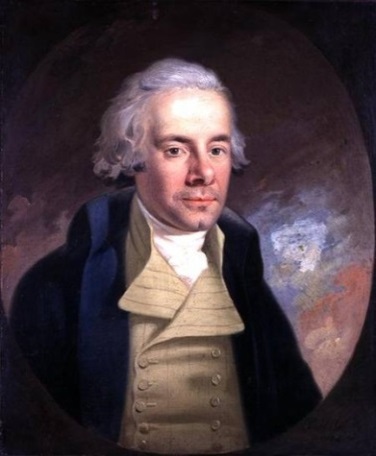
William Wilberforce was one of Britain's great politicians and social reformers. He is
remembered, in particular, for his active participation in getting Parliament to outlaw the slave
trade. He died in 1833, just three days before Parliament passed the Slavery Abolition Act 1833,
which effectively banned slavery in the British Empire.
The movie, Amazing Grace (2007), from director, Michael Apted, tells the inspiring story of how
one man's passion and perseverance changed the world. Based on the-life story of Wilberforce,
the film chronicles his struggle to pass a law to end the slave trade in the late 18th century.
Along the way, Wilberforce meets opposition from members of Parliament who feel the slave
trade is tied to the stability of the British Empire. Several friends, including Wilberforce's
minister, John Newton, urged him to see the cause through.
Charles Finney (1792-1875)
A leader in the Second Great Awakening, Finney has been called "The Father of Modern
Revivalism". Finney studied law from 1818 to 1821, when he had a sudden conversion
experience. After this he began to preach and was licensed to preach by the Presbyterian
denomination in 1824. Wherever he travelled he started extensive religious revivals.
Finney was criticized because he emphasized the will of man in conversion and employed
techniques that became known as "New Measures", calculated to evoke emotional responses.
Impatient with Presbyterianism, he became a Congregationalist, serving New York City's
Broadway Tabernacle. Finney was appointed professor of theology at Oberlin College (1835),
minister of the First Congregational Church at Oberlin (1837), and was named president of the
college in 1852. His Lectures on Revivals (1835) became a handbook for American revivalists.
The King James Version of the Bible

Geneva Bible (1560)

Matthew-Tyndale Bible, 1549

King James Version
In 1604, King James I of England authorized that a new translation of the Bible into English be
started. It was finished in 1611, just 85 years after the first translation of the New Testament
into English appeared (Tyndale, 1526). The Authorized Version, or King James Version, quickly
became the standard for English-speaking Protestants. While fewer people read the KJV today, in
comparison with other versions, its flowing language and prose rhythm has had a profound
influence on English language literature during the past 400 years.
- What do we think about different versions of the Bible? Should they be called
"translations"? Is this diversity trustworthy?
Languages change, so it is important that the Word of God be in a version we can understand.
Consider the following extract from Canterbury Tales, written in English:
He was an esy man to yeve penaunce,
Ther as he wiste to have a good pitaunce.
For unto a povre ordre for to yive
Is signe that a man is wel yshryve;
For if he yaf, he dorste make avaunt,
He wiste that a man was repentaunt;
For many a man so hard is of his herte,
He may nat wepe, althogh hym soore smerte.
Therfore in stede of wepynge and preyeres
Men moote yeve silver to the povre frères
The Westminster Confession of Faith
A comprehensive statement of faith. It is possibly the greatest of all the creeds of the Christian
Church. Since its first publication in 1646 it has remained absolutely unsurpassed as an accurate
and concise statement of Christian doctrine. Among all the shifting sands of theological opinion
here is solid truth, for it has its foundation in the unchanging truth of Scripture--witness the
copious references from the Bible which are printed on each page. Because of its faithfulness to
Scripture the Confession has permanent worth and abiding relevance.
The 18th Century Awakening: What we can learn from it
By Editorial Staff
Published December 1992
Evangelicals in the United States today feel frustrated because they have failed to transform
American society in recent years. English and American evangelicals in 1730 felt much the same
way. Many years of political and social effort had not succeeded in bringing reform. Yet within a
decade they experienced what is now called "The Great Awakening", during which time their
nations' political and social cultures were radically impacted by Christian values. The following
ten characteristics of the revivals that took place in America, England and Europe are instructive:
1. Prayer. Evangelicals in the 1700s learned that corporate prayer was a prerequisite for
outpourings of God's Spirit. The revivals in many places were preceded by days of prayer and
fasting. Jonathan Edwards believed that corporate prayer was more effective than just the
combined prayers of individuals.
2. Leadership. God raised up strong leaders to guide the movement. Jonathan Edwards was the
theologian of the awakenings and his writings were a powerful influence even until the end of the
following century. George Whitefield was a dramatic and powerful orator, able to deeply move
audiences with his sermons. John Wesley was an administrative genius who established an
extremely effective small-group structure of class meetings which kept the revival fires burning.
3. Doctrine. Revival preachers of the time focused on the great Reformation doctrines of
justification by faith and the atonement. They emphasized God's judgment and then his grace.
4. Emotionalism. The revivalists unashamedly appealed to people's emotions. They felt that their
listeners' problem was not a lack of knowledge but a need to take action. They abandoned the
formality of manuscripts or notes and preached as the Spirit led.
5. Music. As one aspect of that emotionalism, evangelicals noted that music was an effective way
to stir religious affectations and they made frequent use of it.
6. Open-air meetings. Whitefield preached in open spaces where large crowds could gather.
Wesley took the message to jails, inns and ships, as well as outdoors.
7. Persecution. At times these preachers faced fierce opposition from hecklers, gangs of attackers
and the press.
8. Testimonies. Reports of revival in other places often sparked new outbreaks as lay people who
had been there first shared firsthand accounts of what the Holy Spirit was doing.
9. Holy Spirit. The 18th-century revivalists expected the Spirit to manifest His presence in
powerful, visible ways.
10. Social action. A greater concern for the poor and downtrodden often resulted from these
revivals. Jonathan Edwards taught that it was the Christian's duty to be charitable. Whitefield
devoted a great deal of his energy to an orphanage he founded in Georgia.
The conclusion can be drawn from the 18th-century experience that a deep and powerful spiritual
renewal can be more effective in transforming a culture than political action.
Gerald McDermott, National & International Report, Dec. 14, 1992
(http://www.sermonindex.net/modules/newbb/viewtopic.php?topic_id=30537&forum=40)
Issues
- What do we understand by revival? Is there a "theology of revival?"
- restoration of basics: relationship with God, prayer, dynamic Word of God
- freshness in worship
- Christocentric Christianity
- passion for reaching the lost; harvest, church planting, mission, church growth
- simplicity, unencumbered by human tradition
- anointed preaching
- demonstrations of the presence and power of God
- emphasis on repentance, holiness (without legalism),
- What were the hallmarks, fruits of genuine revival during the Great Awakening?
Additional Reading
Blainey, G, A Short History of Christianity, Viking, Melbourne, 2011
Bragg, M, The Book of Books: The Radical Impact of the King James Bible 1611-2011, Sceptre, London, 2011
Bunyan, J, The Pilgrim's Progress: From this World to that which is to come delivered under the similitude of a dream, Lutterworth Press, London, 1961 Edition
Lindsay, K, Civil War in England, Frederick Muller, London, 1954
Lion, A Lion Handbook, 1990, The History of Christianity
Miller, A, Miller's Church History: From the First to the Twentieth Century
Miller, B, Charles Finney, Dimension Books, Minnesota, 1941
Renwick, AM, The Story of the Church, Intervarsity Press, Edinburgh, 1973
Brother Lawrence, The Practice of the Presence of God, Paris, 1666, various publishers, including Wilder Publications, Radford, 2008
Leonard Ravenhill, Why Revival Tarries, Baker, 1959, and other works
Wilberforce, W, Real Christianity, Ed by Dr Vincent Edmunds, Hodder and Stoughton, London, 1989 (first published 1787)


 In September 1620, a merchant ship called the Mayflower set sail from Plymouth, a port on the
southern coast of England. On this trip the ship carried 102 passengers, all hoping to start a new
life on the other side of the Atlantic. Nearly 40 of these passengers were Protestant Separatists-
they called themselves "Saints"-who hoped to establish a new church in the New World. Today,
we often refer to the colonists who crossed the Atlantic on the Mayflower as "Pilgrims." The
Puritans believed the Bible was God's law, and that it provided a plan for living. The established
church limited access to God to the confines of "church authority". Puritans sought to strip away
traditional trappings and formalities of Christianity that had been slowly building.
In September 1620, a merchant ship called the Mayflower set sail from Plymouth, a port on the
southern coast of England. On this trip the ship carried 102 passengers, all hoping to start a new
life on the other side of the Atlantic. Nearly 40 of these passengers were Protestant Separatists-
they called themselves "Saints"-who hoped to establish a new church in the New World. Today,
we often refer to the colonists who crossed the Atlantic on the Mayflower as "Pilgrims." The
Puritans believed the Bible was God's law, and that it provided a plan for living. The established
church limited access to God to the confines of "church authority". Puritans sought to strip away
traditional trappings and formalities of Christianity that had been slowly building.








